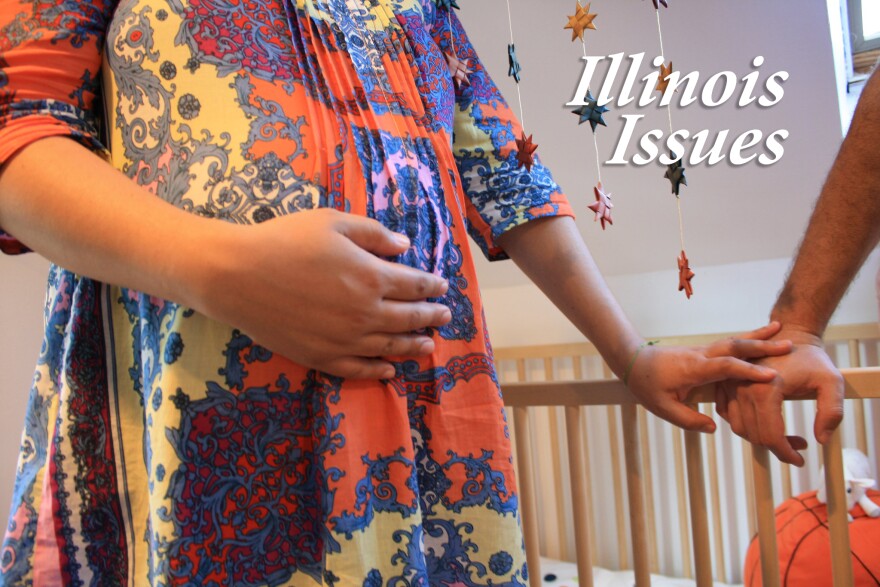As national debate on government-mandated paid family leave continues, lawmakers in Illinois say they want it enacted here.
Two weeks after giving birth to a daughter, Valencia Garrett went back to her job at a Chicago restaurant.
She made the choice to return to her catering coordinator job -- even though she was still recovering from a Caesarian birth. The restaurant where she worked didn’t demand her back that soon, and managers promised her a job whenever she returned.
But she says she took just 14 days of leave because she couldn’t afford not to work.
“It was difficult because I just had my new baby,’’ said Garrett, who is now a part-time shift manager at Meatheads and a full-time teacher at a daycare. “And I felt like I couldn’t really bond with my new baby.”

She had been trying to breastfeed Demoni, now two years old, but had to stop after a couple of months because she wasn’t producing milk.
Illinois Public Radio’s requests to speak to a representative of the Meatheads’ franchise where Garrett works were not answered. But the Bloomington-based burger chain is not unusual among employers of low-income workers. Those employers, advocates say, often choose not to pay workers needing to care for a newborn or an ailing family member for time off.
But that may change if some Illinois lawmakers have their way. Democratic state Sen. Ram Villivalam of Chicago is expected to file paid-family leave legislation similar to a measure passed in the Senate last year. Democratic state Rep. Mary Flowers, also of Chicago, said she plans to reintroduce a revamped version of her family leave measure the legislature failed to consider in 2019.
“When the mother has to rush back to work because of the pay … we are really hurting a lot of families by not getting them paid family leave,” said Flowers, who says she believes leave policies should cover parents and those who act as caregivers to ailing relatives.

If Illinois enforced some form of paid family leave for its residents, it would be the eighth state to do so.
State employees in Illinois had six weeks of paid parental leave until August when Gov. J.B Pritzker’s administration boosted that to 10 weeks. The city of Naperville just approved six- to 12-weeks of paid parental leave for its employees.
In December, President Donald Trump signed into law a measure that gave most federal workers a similar benefit. Congress has had some Republican backers of family leave legislation under consideration.
Those are signals of Republican support but, in Illinois, the business community may be harder to convince.
Todd Maisch, president and CEO of the Illinois Chamber of Commerce, says his group is opposed to a mandated family leave plan. He says offering the benefit should be optional for employers.
“Anytime you've got a government mandate on a place of employent, government gets it wrong just as often, if not more often, than they get it right,’’ he said. “So I'd say that we are always more comfortable with policies that [incentivize] employers to go ahead and be able to offer more benefits to employees, but mandates simply do not work.”
According to a recent report by the Illinois Economic Policy Institute and the University of Illinois’ Project for Middle Class Renewal, there are benefits of paid family leave to business, as well as for children. That recent report touts lower turnover and higher local spending when workers are allowed to take time off at critical life moments.
Researchers say workers would reap $1.4 billion in annual wages with such a leave program, and lower infant mortality rates are associated with parents having paid family leave.
“Ultimately, paid parental leave is first and foremost about the health and well-being of newborn children, adopted children and their parents,’’ said Jill Gigstad, lead author of the report. “But it also has a lot of economic impact, as well.”
Robert Bruno, a co-author and director of the U of I 's project, explains:
“It is quite costly when workers leave the labor force. It’s costly, short term. It's costly, long term,’’ he said. "We estimated was that without a really solid leave program in the state, that that turnover or retention rate problem costs the economy roughly $456 million – that’s Illinois.”
Jessica Mason is with the National Partnership for Women and Families. She says the need for paid family leave is growing because of demographic changes.
“In the majority of households -- that's in 73% of Illinois households with children -- all parents who are available have paying jobs, and so that means that we no longer have, if we ever had, the sort of Mad Men-era idea where there's someone at home who can take care of all of the caregiving, whether it's for a child or an aging parent.”
Sarah Labadie is with the organization Women Employed, which backs a concept of paid family leave that would be open to mothers, fathers, adoptive parents and those who need to take care of an adult.
“We do think the climate is ripe to really start talking about a paid family and medical leave program here in Illinois,’’ she said. “While we do think there's energy around it, and it is bipartisan... we don't want to wait to see what happens federally when we might be able to do some good here in the state.”
Mary Flowers says the bill she will propose again is in the best interest of the state.
“There comes a time when we should not have to make choices between taking care of our loved ones or maintaining our jobs to take care of our loved ones.’’







